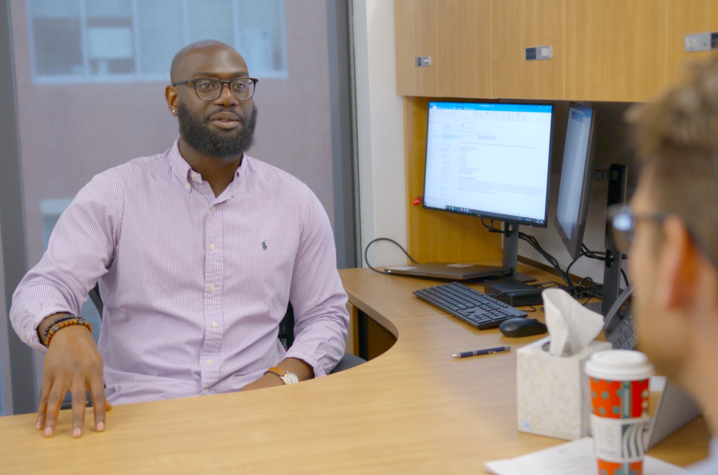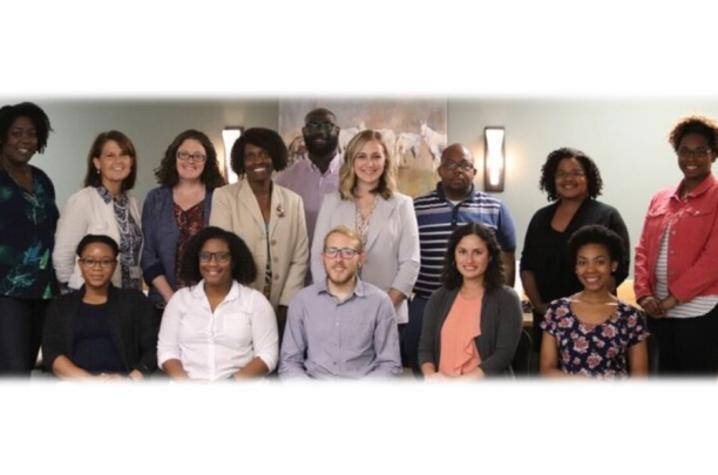DREAM Program Expands Community, Career Development for Health Equity Researchers from Underrepresented Minorities
LEXINGTON, Ky. (March 26, 2021) — Since 2018, the Disparities Researchers Equalizing Access for Minorities (DREAM) Scholars Program has supported the training of exceptional, underrepresented pre-docs, post-docs and assistant professors at the University of Kentucky who are committed to health equity research.
The program originally began in 2015 as mentoring program in the UK College of Nursing for “people who needed to belong—racial, sexual, and gender minorities”, said Lovoria Williams, Ph.D., who currently co-directs DREAM. Now led by the Center for Clinial and Translational Science (CCTS) and the Center for Health Equity Transformation (CHET), DREAM has evolved into a robust, multidisciplinary career development opportunity for researchers from across UK’s colleges.
Since 2018, when administration of the program shifted to the CCTS and CHET, 15 Scholars have received support from DREAM; between them, they’ve published an impressive 141 scholarly articles.
Most recently, the impact and importance of the program compelled the UK Markey Cancer Center and the Cardiovascular Research Priority Area to each sponsor an additional DREAM Scholar position per year, bringing the total number from five to seven. Up to five DREAM Associates are also chosen bi-annually.
The support provided by the program—which includes two years of research methods training, mentorship, and, for Scholars, pilot and travel funding—can make a big difference in someone’s career.
Diane Francis, PhD, applied to be a DREAM scholar soon after she was hired at UK and said the program helped her be much more successful than she would have been otherwise. Her work focuses on how to best utilize communication to reduce health disparities and achieve racial health equity. During her time as a DREAM Scholar, she designed and evaluated a pilot cancer prevention intervention. She's also working on a statewide COVID-19 survey with her mentor Marc Kiviniemi, PhD, from the College of Public Health.
“The funding provided through the DREAM program on pilot and one-off projects has led directly to publications and conference presentations,” she said.” The DREAM program also gave me the space to think about my whole research program. Thinking five years into the future can be scary. But knowing where you want to be, what kind of research you want to do, what pilot data will you need, etc. is vital to success. Answers to those questions are addressed during the program.”
Williams points out that beyond the training and funding, perhaps the most important aspect of the DREAM program is the community it provides, often to people who are likely familiar with being the only person of color in a meeting. In Williams’ previous role at the University of Georgia, she ran a program similar to DREAM; here at UK, she’s glad to leverage her position in the CCTS to develop an RFA specifically aimed at influencing the careers of researchers from underrepresented minorities.
“To be able to bring diverse people together—for them to be able to see there are other people like them in research, and to grow our networks—that’s been the greatest joy of this program. To provide DREAM Scholars and Associates with a sense of community and value in their work” she said.
For Francis, the support of the DREAM community has been “invaluable”.
“I loved hearing how each of my DREAM Scholars colleagues was progressing through their respective research stages. Seeing the amazing work produced by other junior scholars in DREAM has been a source of reassurance to me,” she said.
Francis is now serving as a peer mentor to the incoming 2021-2023 DREAM cohort (which is announced at the end of this article) and says she’s excited to help build the careers of junior scholars whose work addresses racial health equity or who come from underrepresented groups.
For Myles Moody, who was a DREAM Associate while finishing his PhD in sociology at UK, the program also provided essential training, a network of multidisciplinary colleagues, and mentoring that equipped him to be a successful researcher. This past year, after completing his degree, he landed a faculty position at the University of Alabama Birmingham, where his work focuses on how the stress of experiencing racism (and vicarious racism) drives mental and physiological health outcomes, including mortality.
“In DREAM, we had the space to learn in areas similar to our work, but the program also exposed you to new areas. As sociologists, for example, we’re not trained to do National Institutes of Health-type work, but DREAM gave me that exposure. They taught me about the IRB, different grant mechanisms, and even provided a space to practice conference presentations or job talks and get really great feedback,” he said. “And it’s a system that connects you with colleagues both at your level and who are more senior. My DREAM mentor, Dr. Brittany Smalls, has continued to be a great mentor to me beyond my time at UK. She was a second a year faculty member, and working with her allowed me to see what scholarship looked like at the next level.”
Smalls, who had been through a DREAM scholar herself and was serving as peer mentor, additionally helped inform the evolution of the program by assisting with training development and topic selection. She has recently accepted the position of assistant director of DREAM, as Williams assumes a new role as an associate director of the CCTS. Vicky King, PhD, the director of career development for the CCTS serves as the Career Development Director for the DREAM Scholars Program.
While in the DREAM program, Moody got to pay forward some of the mentorship he received by assisting with the SPARK (Students Participating as Ambassadors for Research in Kentucky) Program, which allows undergraduate students from underrepresented backgrounds to get a jumpstart in health equity research, beginning their first year of college.
Participants, called SPARKlers, design, implement, analyze data, and present findings from a health equity research in their home communities with training and mentorship from UK experts and community partners. Moody served as one of these instructor/mentors, which he describes as his “favorite obligation” while at UK.
“When Dr. Nancy Schoenberg, who directs CHET, shared with me some programs she wanted to get started, I knew I wanted to take the lead on SPARK,” he said. “I was prepared to teach undergrads how to do research, and that was my passion—working with people at that beginning level and showing them how to take an idea through the entire process of going into their communities, collecting data, and presenting research. I felt really fulfilled.”
It’s imperative, Moody said, to have programs at every level (not just for graduate students and faculty) that aim to address the centuries-old crisis of racial disparities in health.
“W.E.B Du Bois was one of the first to document racial disparities of health. In his 1899 work The Philadelphia Negro, he documented all the social statistics about why Black people were dying so much earlier—basically what we now call the social determinates of health. We’ve always had a public health crisis of racial disparities, even if it wasn’t always framed this way. And we need training from very early in our educations to address it.”
The 2021-2023 DREAM cohort has just been awarded. The recipients are:
Sheila Barnhart, MSW, Ph.D., LISW-S (Scholar)
- Assistant Professor, College of Social Work
- Research Topic: The family stress model and Hispanic/Latinx families
- Mentor: Antonio Garcia, MSW, Ph.D.
Laneshia Connor, Ph.D. (Scholar)
- Assistant Professor, College of Social Work
- Research Topic: Feasibility study of an adapted HIV behavioral intervention for older women: Woman to Woman (W2W)
- Mentor: Carrie Oser, Ph.D.
Brittany Givens, Ph.D. (Scholar)
- Assistant Professor, College of Engineering
- Research Topic: Efficacy of sustained-release chemotherapeutic formulations for addressing racial disparities among endometrial cancer deaths
- Mentor: Nancy Schoenberg, Ph.D.
Ian Boggero, Ph.D. (Scholar)
- Assistant Professor, College of Dentistry
- Research Topic: Establishing the acceptability of a psychological telehealth intervention for chronic orofacial pain in rural kentucky
- Mentor: Tyrone Borders, Ph.D., FACE
Firaz Peer, Ph.D. (Scholar)
- Assistant Professor, College of Communication and Information
- Research Topic: Exploring religio-cultural interventions in substance abuse treatment information infrastructures
- Mentor: Hilary Surrat, Ph.D.
Jessica Flores, MS (Scholar)
- Doctoral Candidate, College of Arts and Sciences Department of Clinical Psychology
- Research Topic: Understanding the sexual health and intimate relationships of young adult Latinas
- Mentor: Christal Bador, Ph.D.
Melinda Murdock, MS (Scholar)
- Doctoral candidate, College of Agriculture, Food and Environment Department of Family Sciences
- Research Topic: Contextual theory: a framework for relational and racial equity in relationships
- Mentor: Nathan Wood, Ph.D.
Juan Canedo, DHSc, MA (Associate)
- Assistant Professor, College of Medicine
- Research Topic: Adherence to follow up after positive hrHPV testing among Hispanic Women
- Mentor: Mark Dignan, Ph.D., MPH
Kendra Oo, MS (Associate)
- Doctoral Candidate, College of Education Department of Kinesiology and Health Promotion
- Research Topic: Formative research in the development of an intergenerational community empowerment health equity initiative among marginalized older and young adults
- Mentor: Melinda Ickes, Ph.D.






